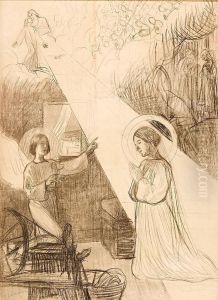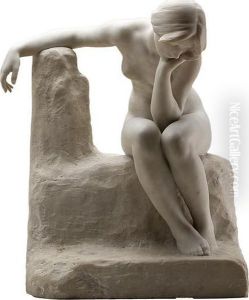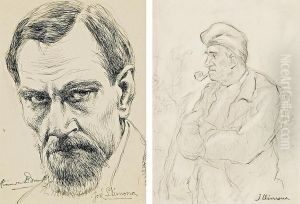Josep Llimona Bruguera Paintings
Josep Llimona Bruguera was a prominent Catalan sculptor, born on April 8, 1864, in Barcelona, Spain. He emerged from a cultural milieu ripe with the Modernisme movement, the Catalan variant of Art Nouveau, which significantly influenced his artistic development. Llimona is considered one of the leading figures of Catalan sculpture at the turn of the 20th century, his work characterized by a profound sense of spirituality and an exquisite delicacy in form.
Llimona received his initial artistic training at the Llotja School in Barcelona, where he was taught by the likes of Antoni Caba and Agapit Vallmitjana. His talent was recognized early on, and he furthered his studies in Rome, which was a pivotal experience that shaped his creative outlook. The influence of Renaissance art, along with the contemporary Symbolist movement, is evident in Llimona's sculptures, which often explore themes of grief, religious contemplation, and human introspection.
Throughout his career, Llimona was awarded numerous accolades, including the prestigious Rome Prize, which allowed him to extend his stay in Italy. Upon returning to Barcelona, he became a key member of the Catalan art scene, contributing significantly to public and private commissions. His most famous work, 'Desconsol' ('Distress'), created in 1907, is a masterpiece of Modernisme sculpture, showcasing his skill in capturing human emotion and the beauty of the human form in marble. This piece, among others, solidified his reputation and is considered a symbol of Catalan Modernism.
Llimona was also a co-founder of the Cercle Artístic de Sant Lluc, an association aimed at promoting Christian art and values in the modern world, reflecting his deep personal commitment to his faith and its influence on his work. Over his career, he explored various materials, including bronze, stone, and marble, demonstrating versatility and a profound understanding of each medium's unique qualities.
Josep Llimona Bruguera passed away on February 27, 1934, in Barcelona. His legacy endures in the numerous sculptures that adorn public spaces and museums, notably in Catalonia but also internationally. Llimona's contributions to art are remembered as a bridge between traditional and modernist expressions, reflecting a deeply humanistic approach to sculpture that continues to inspire and move audiences today.


